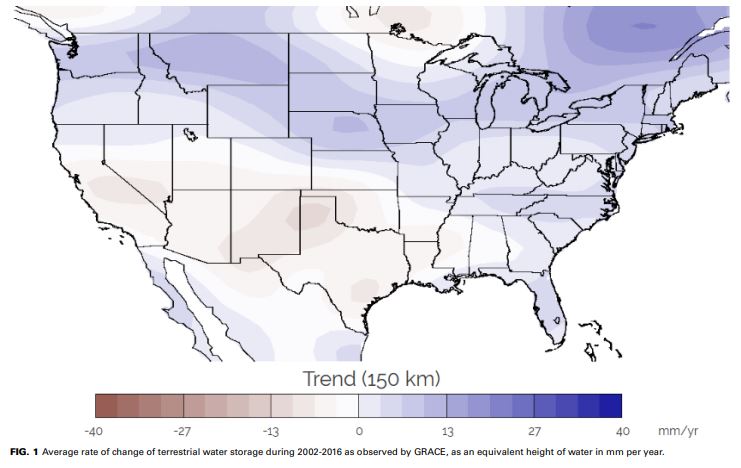We ask Keith Schilling, State Geologist and Research Scientist at the Iowa Geological Survey, the question: What is groundwater?
Continue readingThe Importance of Groundwater and How to Monitor it From Space
When water from rainfall and snowmelt enters and saturates the soil column, some of that water flows to streams, some evaporates and some is absorbed by plant roots. The rest drains downward to recharge underground aquifers, where it can remain for months, years or even millennia. If you dig deep enough, groundwater can be found almost anywhere, even beneath the Sahara Desert. Groundwater is vital to both people and ecosystems because of the ability of aquifers to store water during wet periods for use during dry periods. It supports domestic, municipal, industrial and especially agricultural usage in places where surface waters are not available, and it sustains streams and rivers, via contributions to baseflow, in between precipitation events
Continue readingAsk a Scientist – Groundwater
We ask Keith Schilling, State Geologist and Research Scientist at the Iowa Geological Survey, the question: Why is groundwater important?
Continue readingAsk a Scientist – Groundwater and INRS
We ask Keith Schilling, State Geologist and Research Scientist at the Iowa Geological Survey, the question: Why is groundwater important to the Iowa Nutrient Reduction Strategy?
Continue readingAsk a Scientist – Iowa Geological Survey
We ask Keith Schilling, State Geologist and Research Scientist at the Iowa Geological Survey, the question: What is the Iowa Geological Survey?
Continue readingIowa Groundwater Association Conference March 31
The Iowa Water Conference isn’t the only learning opportunity around these here parts – make sure you sign up to attend the Iowa Groundwater Association‘s Spring Conference. Registration is due in advance, so hop on over to their website to register – $75/members, $100/non-members, and $25/students until 3/24.
The details:
Thursday, March 31, 2016
DMACC Conference Center Auditorium – 600 N. 2nd Ave. West, Newton, Iowa
IGWA is honored to present this exciting line-up of speakers for our spring conference! Please join us in learning about the Flint Water Study, the DMWW lawsuit, avian influenza, antibiotic resistant bacteria, arsenic, radionuclides, and source water protection!
CEU’s are available for Groundwater Professionals (2), Certified Well Contractors (6), and Water Treatment Operators (0.5).
Presentations:
- Detection of Avian Influenza A in Groundwater: Results from the 2015 HPAI Outbreak – Laura Hubbard, USGS
- Protecting Source Waters in Agricultural Watersheds – Bill Stowe, Des Moines Water Works
- Flint Water Study – Anurag Mantha, Virginia Tech
- Fate and Transport of Antibiotic Resistant Bacteria and Resistance Genes in Tile Drained Agricultural Fields Receiving Swine Manure Application Over Four Years – Elizabeth Luby, Iowa State University
- Arsenic and Old Wells: Reducing Contamination Risks for Private Well Users – Sophia Walsh, Cerro Gordo County Dept. of Public Health
- Radionuclides in Alluvial and Shallow Bedrock Aquifers – Dustin May, State Hygienic Laboratory/University of Iowa
- Hydrogeologic Reconnaissance and Characterization for a Groundwater Source of Supply: Fort Madison, Iowa Case Study – Greg Brennan, HR Green
